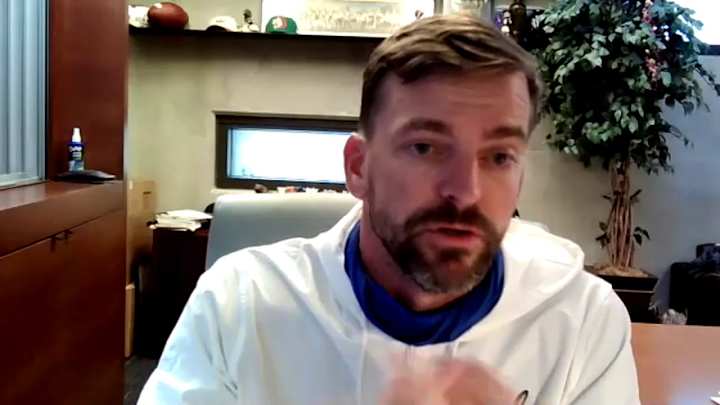Cal Football: ASU Game in Doubt, Contact Tracing, the Confusion

Three questions have arisen since Cal’s season-opening game against Washington was canceled:
---Will Cal’s Nov. 14 game at Arizona State be canceled too?
---What the heck is contact tracing, since that is the element that forced the cancellation of Saturday’s Cal game against the Huskies?
---How can Cal’s game be canceled when just one asymptomatic Golden Bears player tested positive while Clemson is playing its second straight game with quarterback Trevor Lawrence sitting out because he tested positive? (In fact Lawrence was expected to be on the Clemson sidelines for Saturday’s road game against Notre Dame.)
Cal wide reciver Nikko Remigio notes the frustration:
Exactly. Make it make sense... https://t.co/THPduWxlvA
— Nikko Remigio (@nikkoremigio) November 7, 2020
The first question has a short but incomplete answer: The odds are less than 50-50 that the ASU-Cal game will be played, but it will depend on how the Berkeley Public Health Department rules, a decision that probably needs to be made by Monday for Cal to have a reasonable chance to prepare for the contest.
A cancellation of the Arizona State game would leave Cal with only four games before the Pac-12 championship game.
The second question focuses on a new football phrase of importance: contact tracing.
The Mayo Clinic website describes it as a tool to help slow the spread of the coronavirus. The names of people who have recently been diagnosed with COVID-19 are sent to their local health department, and those people are asked which people came into close contact with them (within 6 feet) within two days of the diagnosis. Health department officials then alert people who had those close contacts that they may have been exposed to the COVID-19 virus.
Justin Wilcox said the Cal player who tested positive has shown no symptoms and the players he came into contact with him tested negative. For those people the Mayo Clinic says this:
For close contacts who don't have symptoms and can't be tested, or test negative for the COVID-19 virus, doctors and the health department will:
---Ask them to self-quarantine at home for 14 days after they were exposed.
---Request that they keep social distance from others. They may be asked to isolate themselves from family and pets, and use a separate bedroom and bathroom.
---Request that they monitor their health and watch for any COVID-19 symptoms.
---Ask them to check their temperature twice a day.
---Ask them to let their doctor and health department know right away if they develop any symptoms.
---Request that they send doctors and the health department daily health updates.
Only one Cal player—reportedly a lineman, and most likely a defensive lineman—tested positive, but the entire position group (presumably the defensive line) was part of the contact tracing that resulted in the game cancellation.
The final question is where a lack of conformity in the conference and across the nation comes into play in a frustrating way.
In the Pac-12, a decision about whether a game should be canceled is left up to the universities and their local public health officials. For Cal that’s Berkeley Public Health, which has severe restrictions when it comes to the coronavirus. It’s an admirable approach considering more than 235,000 American have died from that virus with many more deaths expected.
This Oct. 28 story on KPIX had this headline: "Berkeley Touts Lowest COVID-19 Rates Since Start of Pandemic as Cases Surge Nationwide" and began with this news:
BERKELEY (CBS SF) – As much of the United States is dealing with a surge in COVID-19 cases, city officials in Berkeley announced the lowest rates of infection in the city since the start of the coronavirus pandemic.
Officials said as of Tuesday, there have been 757 confirmed cases of COVID-19 in Berkeley, representing 0.63 percent of the population. The city’s seven-day average is about two cases per day and the test positivity rate is 0.29% over the last four weeks.
But this is not the same approach of health officials in other Pac-12 cities or other FBS schools across the country.
"I think the frustrating part is you see the differences throughout the country -- throughout the state and the country -- on how these contact tracing processes are taking place," Wilcox said Thursday in his reaction to the cancellation.
**Wilcox says there are a number of different approaches throughout the country
What a spokesman from Berkeley Public Health told ESPN on Thursday is informative:
A spokesman for Berkeley Public Health told ESPN the negative test results do not allow someone to exit the quarantine protocol because the incubation period for COVID-19 is believed to be 14 days.
"The reason that the 14-day quarantine exists is that's the amount of time over which somebody could develop the disease," Matthai Chakko, a spokesman for Berkeley Public Health, told ESPN. "[A negative test] doesn't cure somebody's COVID-19 and it doesn't remove the chance that the virus may appear. That's what the quarantine order is based on."
The start of the quarantine can vary from player to player, depending on when they were determined to be close contacts of the player who is confirmed positive, and the school is working to understand how the orders are applied on a case-to-case basis.
According to Chakko, the health department made its determinations for who had to be placed into quarantine based on interviews with those in the football program.
"We do interviews with the [person who tests positive], who that person was with for how much time and under what conditions," Chakko said. "And based on those interviews, you start to determine who you do other interviews with and you determine how much time they were with each person and whether that matches public health thresholds."
In other words, Cal still has a chance to be cleared in time to play at Arizona State next week, but the prospects are not promising.
Two other examples of how cancellations were determined in other places:
Wisconsin has had two games canceled, including this week’s contest against Purdue. Wisconsin currently has 27 active COVID-19 cases within its football program, 15 of whom are players.
Athletic director Barry Alvarez and Chancellor Rebecca Blank made the final decision. Had the spread of the virus reached the most severe level on the Big Ten’s virus hierarchy, the Big Ten would have automatically canceled the game.
(For Big Ten protocols, click here.)
Louisville played last week’s game against Virginia Tech despite having nine players sidelined for virus-related reasons. But this week’s game against Virginia was canceled after Louisville athletic director Vince Tyra said the football program was dealing with 15 COVID-19 cases, with seven more people in quarantine.
The decision was made after Tyra consulted with the university’s chief medical officer and conferred with ACC and Virginia officials.
**Wilcox addresses the possibility of moving the site of Cal home games out of Berkeley:
Follow Jake Curtis of Cal Sports Report on Twitter: @jakecurtis53
Find Cal Sports Report on Facebook by searching: @si.calsportsreport
Click the "follow" button in the top right corner to join the conversation on Cal Sports Report on SI. Access and comment on featured stories and start your own conversations and post external links on our community page.
